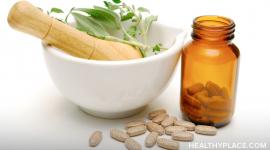Do Adult ADHD Natural Treatments, Natural Remedies Work?

Do adult ADHD natural remedies work? The answer is a controversial one. Some people insist that largely disproven dietary interventions, such as the Feingold Elimination Diet, work, while others believe any improvement due to this and other remedies are short-lived and based on a placebo effect, rather than actual efficacy of the method ("Diet for ADHD: Does Food Really Make a Difference?").
Vitamins and Supplements as an Adult ADHD Natural Treatment
Can taking daily vitamins and supplements provide effective natural treatment for ADHD in adults? Due to the increasing popularity of alternative and complementary medicine concepts, people now have numerous choices in nontraditional approaches to personal health and wellness. Alternative remedies are used in place of traditional medicines and complementary remedies are used in addition to traditional treatments. Patients should exercise caution when trying a natural remedy for their ADD. Always talk to your doctor first before beginning any natural treatment regimen for your condition.
Zinc
Some research has shown that people with ADHD have insufficient amounts of zinc in their bodies. A few studies have indicated that adding zinc supplements as a complementary natural ADHD treatment. While numerous studies indicate that adding zinc supplements reduces hyperactivity and impulsive behavior, they also show it as causing no improvement in attention span. Try eating foods rich in zinc, such as nuts, whole grain, dairy products, meats and poultry, beans, and seafood. It may work to reduce hyperactivity and impulsivity; thus, providing partial success as an adult ADHD natural treatment.
Omega-3 Fatty Acids
A few studies suggest that this fish oil can act as an effective natural treatment for ADHD in adults. These studies indicate that supplementing diets with omega-3 fatty acids, fish oil, improved mental skills, decreased hyperactivity/impulsivity, and enhanced attentiveness and alertness. The specific study that reported these findings used an omega-3 fatty acid and evening primrose oil supplement.
St. John's Wort
A common herbal remedy used to treat depression, insomnia, and anxiety. Study results report that St. John's Wort is not an effective natural treatment for ADHD in adults.
Exercise as a Natural Treatment for ADHD in Adults
Adding a routine of daily rigorous exercise may help mitigate restlessness, chronic boredom, and impulsivity, which are hallmark symptoms of ADHD in adults. However, never embark on any new exercise routine without first consulting your doctor. Further, use exercise as a complementary therapy in addition to ADD, ADHD drugs – not as an alternative.
Adult ADHD Natural Remedies Not Recommended as Treatment
No definitive, empirical data exists proving the efficacy and reliability of natural remedies as a treatment for adult attention deficit hyperactivity disorder. When used in conjunction with traditional treatments, they are relatively safe. Other, unproven and/or ineffective, alternative treatments that you may come across when researching adult ADHD natural remedies include:
- Yeast (Candida albicans) elimination from the diet.
- Elimination of sugar
- Iron supplements
- Herbal medicines, such as ginkgo biloba and lemon balm
- Homeopathy – stramonium, cina, hyoscyamusniger
- Biofeedback
More scientific research is necessary before experts will consider any of these adult ADHD natural remedies as safe and effective. Currently, traditional medicines and adult ADHD treatments represent the best and most effective way to treat adult ADHD.
APA Reference
Gluck, S.
(2021, December 20). Do Adult ADHD Natural Treatments, Natural Remedies Work?, HealthyPlace. Retrieved
on 2025, December 5 from https://www.healthyplace.com/adhd/adhd-adults/do-adult-adhd-natural-treatments-natural-remedies-work



